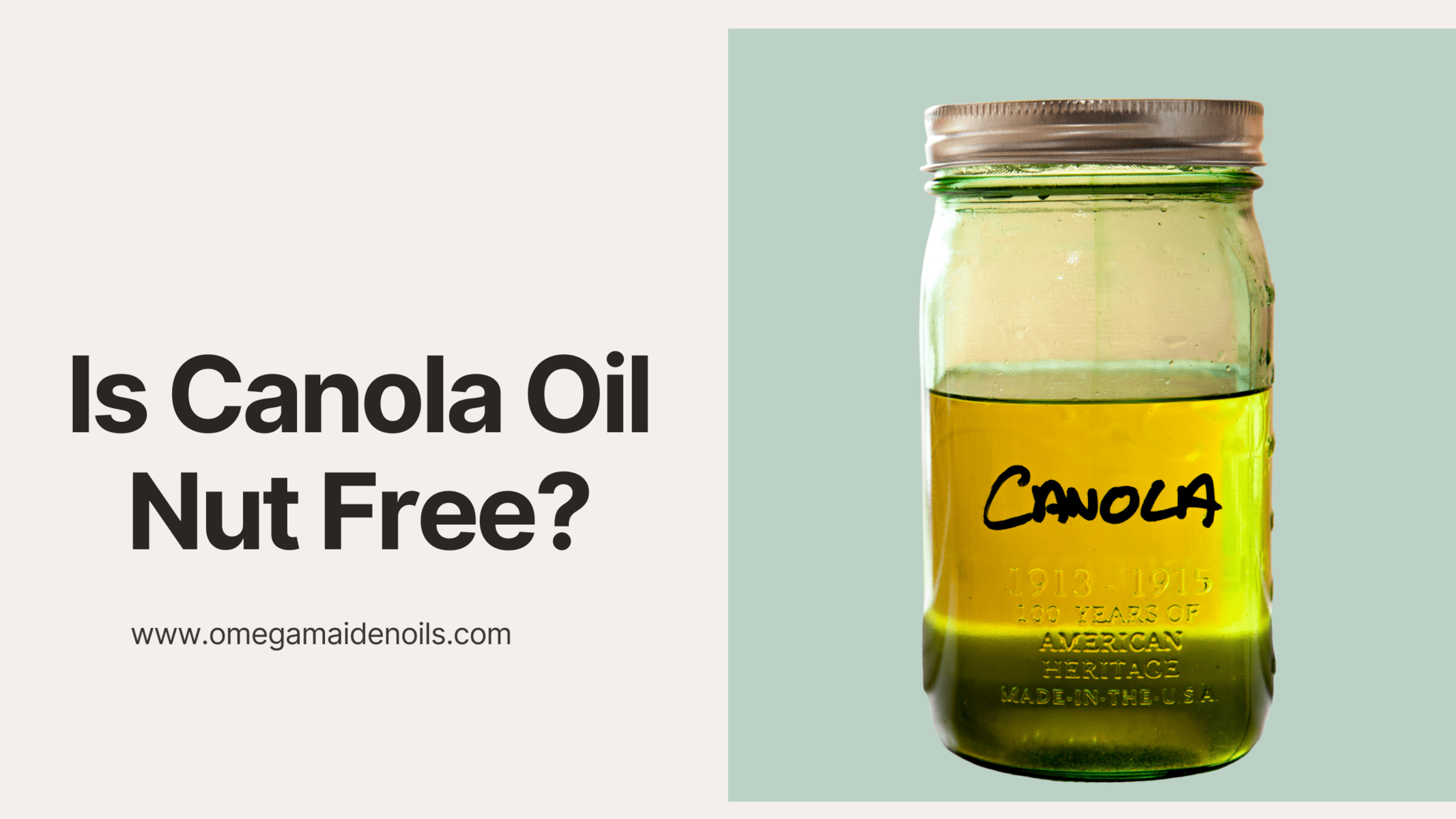Canola oil is a type of vegetable oil that is extracted from the rapeseed plant. The name “canola” was derived from the words “Canadian” and “oil.” Canola oil is often used in cooking and baking, as it has a high smoke point and neutral flavor.
Canola oil is also considered to be a healthy option, as it is low in saturated fat and high in monounsaturated fat. While canola oil is not technically nut-free, it is considered to be safe for people with nut allergies. This is because the proteins that cause allergic reactions are not present in canola oil.
Canola oil is a vegetable oil derived from a variety of rapeseed that is low in erucic acid, as opposed to colza oil. There are both edible and industrial forms produced from the seed of any of several cultivars of the plant family Brassicaceae, namely cultivars of Brassica napus L., Brassica rapa subsp. oleifera (syn. B. campestris L.), or Brassica juncea, which are also referred to as “canola type” rapeseed.
The name “canola” was coined in Canada in the 1970s.
What Oils are Safe for Nut Allergies
If you have a nut allergy, you may be wondering which oils are safe for you to use. The good news is that there are many oils that are safe for nut allergies, and you can use them in a variety of ways.
Some of the most popular oils that are safe for nut allergies include olive oil, coconut oil, and sunflower oil.
These oils can be used for cooking, baking, or even as a salad dressing. If you’re looking for an oil that has a high smoke point, avocado oil is a good option.
When it comes to using essential oils, there are also many options that are safe for nut allergies.
Some of the most popular ones include lavender oil, chamomile oil, and tea tree oil. You can add these oils to your diffuser or diluted with water and applied topically.
Whether you’re looking for an oil to cook with or one to use for aromatherapy, there are plenty of options available that won’t trigger your nut allergy.
So go ahead and experiment with different oils until you find the perfect one for you!
Is Vegetable Oil Nut Free
If you have a nut allergy, you may be wondering if vegetable oil is safe for you to consume. The short answer is yes, vegetable oil is typically nut-free. However, it’s always important to check the labels of any food product before consuming it, as manufacturers can sometimes change their ingredients without notice.
Vegetable oil is made from a variety of plant-based sources, such as soybeans, corn, rapeseed, and sunflowers. These oils are then refined and mixed together to create the final product. Because there are no nuts involved in the production of vegetable oil, it’s generally considered safe for people with nut allergies.
Of course, as with any food product, there’s always a slight risk that traces of nuts could be present in vegetable oil due to cross-contamination during manufacturing or packaging. For this reason, it’s always best to err on the side of caution and check the label carefully before consuming any food product – even if it’s something you normally eat without issue.
In summary, vegetable oil is usually nut-free and safe for people with nut allergies to consume.
However, as with all food products, it’s important to check the label before eating anything to ensure that there are no traces of nuts present.
Is Sunflower Oil Nut Free
Most people think of sunflower oil as being a nut-free product, but there is actually a small chance that it could contain traces of nuts. This is because the oil is often processed in facilities that also process nuts, and there is a possibility that cross-contamination could occur. If you are allergic to nuts, or if you are simply avoiding them for dietary reasons, it’s important to check the label of any sunflower oil products to make sure that they are indeed nut-free.
Is Vegetable Oil Safe for Peanut Allergy
As someone with a peanut allergy, I can tell you that vegetable oil is not safe for people with this condition. Peanut oil is often used in cooking and can be found in many processed foods. Even trace amounts of peanut oil can trigger an allergic reaction, so it’s important to avoid it if you have a peanut allergy.
If you’re not sure whether a food contains peanut oil, always check the label or ask the manufacturer.
Canola Oil Allergy
If you’re allergic to canola oil, you’re not alone. According to the Asthma and Allergy Foundation of America, canola oil allergies are on the rise. The good news is that there are plenty of other oils to choose from that won’t trigger your allergy.
Canola oil is made from a type of rapeseed, and it’s commonly used in cooking and baking. It’s also found in some processed foods like chips and crackers. Canola oil allergies are usually triggered by an immune response to the proteins in the oil.
Symptoms can range from mild (hives, itchiness) to severe (anaphylaxis).
If you suspect you have a canola oil allergy, talk to your doctor. They can perform a skin prick test or blood test to confirm the diagnosis.
Once you know you’re allergic, avoiding canola oil is the best way to prevent a reaction. Read food labels carefully and be sure to ask about ingredients when dining out.
There are plenty of other oils that can be used in place of canola oil, so don’t let an allergy stop you from enjoying your favorite foods!
Is Canola Oil Ok for Peanut Allergy?
There is a lot of confusion out there about whether canola oil is safe for people with peanut allergies. The short answer is yes, canola oil is generally safe for people with peanut allergies. However, there are a few things to keep in mind.
First, it’s important to check the labels of any canola oil you purchase to make sure it doesn’t contain any peanuts or peanut products. Some brands of canola oil may use peanuts in their manufacturing process, so it’s always best to double-check.
Second, even if a canola oil label says “peanut-free,” it’s still possible that the oil could be contaminated with peanuts during processing or packaging.
If you’re extremely allergic to peanuts, it’s probably best to avoid canola oil altogether.
Third, some people who are allergic to peanuts may also be allergic to other oils in the mustard family, such as rapeseed and sesame seed oils. If you’re not sure whether you’re allergic to these other oils, it’s best to consult with an allergist before using canola oil.
Overall, canola oil is usually safe for people with peanut allergies. However, as with all food allergies, it’s always best to err on the side of caution and avoid anything that could potentially trigger an allergic reaction.
Does Canola Oil Have Nuts?
Canola oil is made from the crushed seeds of the canola plant. These seeds do not contain nuts.
Does Canola Oil Have Any Allergens?
Canola oil is a vegetable oil that is derived from the rapeseed plant. Unlike other oils that are made from seeds, canola oil is low in saturated fat and high in monounsaturated fat. This makes it a healthier option than other oils on the market.
Canola oil does not contain any allergens, making it a safe choice for those with allergies or sensitivities.
What is Canola Oil Made Of?
Canola oil is a plant-based oil that is extracted from the seeds of the canola plant. The canola plant is a member of the brassica family, which also includes cabbage, broccoli, and kale. Canola oil is made up of approximately 58% oleic acid, a monounsaturated fat, and 27% linoleic acid, a polyunsaturated fat.
These two types of fatty acids are considered to be “heart healthy” fats because they can help to lower cholesterol levels and reduce the risk of heart disease. In addition to these two main types of fatty acids, canola oil also contains smaller amounts of saturated fat (approximately 7%), as well as vitamin E and phytosterols, which are both antioxidants.
Canola oil has a light flavor and texture, making it ideal for use in baking and cooking.
It is also relatively inexpensive compared to other oils on the market. Canola oil has a high smoke point, meaning that it can withstand high temperatures without burning or smoking. This makes it ideal for frying foods.
Despite its many benefits, there are some drawbacks to using canola oil. One concern is that most commercial varieties of canola oil are made from genetically modified (GM) crops. GM crops have been controversial due to concerns about their safety and environmental impact.
Another drawback is that canola oil is highly refined and processed.
Is Canola Oil Bad For You? – DR. MIKE ISRAETEL WAS WRONG
Conclusion
Canola oil is a type of vegetable oil that is extracted from the seeds of the canola plant. The canola plant is a member of the brassica family, which also includes cabbage, broccoli, and cauliflower. Canola oil is considered to be nut-free because it does not contain any nuts.

